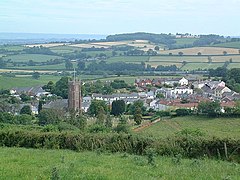Bradninch
| Bradninch | |
|---|---|
 Bradninch from Castle Hill, St Disen's Church is to the left |
|
| Bradninch shown within Devon | |
| Population | 2,041 (2011 census) |
| OS grid reference | SS9903 |
| District | |
| Shire county | |
| Region | |
| Country | England |
| Sovereign state | United Kingdom |
| EU Parliament | South West England |
Bradninch is a small town and former manor in Devon, England, lying about three miles south of Cullompton. Much of the surrounding farmland belongs to the Duchy of Cornwall. There is an electoral ward with the same name. At the 2011 Census the ward population was 2,041.
In 2012, in research of 2,400 postcodes in England and Wales which took into account 60 separate factors of interest to young families, Bradninch was found to be the fifteenth most family friendly location in the country.
The town is twinned with Landunvez in Brittany.
The place-name 'Bradninch' is first attested in the Domesday Book of 1086, where it appears as 'Bradenese'; the name is thought to mean 'broad oak' or 'broad ash'. Seventy-nine different spellings of the name of the town have been recorded.
Bradninch dates back to before the 7th century and at some time there was almost certainly a Norman or Saxon fortress on Castle Hill. There are no physical remains, and no known primary documentary references, but the likely site was surrounded by a number of 'castle' field names on the tithe map. It would have been unusual for Bradninch not to have had a castle given its status in the medieval period.
Bradninch was the caput of the feudal barony of Bradninch granted by William the Conqueror (1066–1087) to William Capra, who is listed in the Domesday Book of 1086 as holding this manor. The barony escheated to the crown and King Henry I (1100–1135) granted it to his illegitimate son William I de Tracy (d.circa 1136). He left one daughter and sole-heiress Grace de Tracy who married John de Sudeley, They had two children: Ralph de Sudeley (d. 1192), the eldest, who became his father's heir, and Sir William II "de Tracy" (d. post 1172), who inherited his mother's barony of Bradninch and assumed her family name in lieu of his patronymic. He married Hawise de Born and had a son William III de Tracy (d. pre-1194), one of the four knights who assassinated Thomas Becket, Archbishop of Canterbury, in December 1170.
...
Wikipedia

